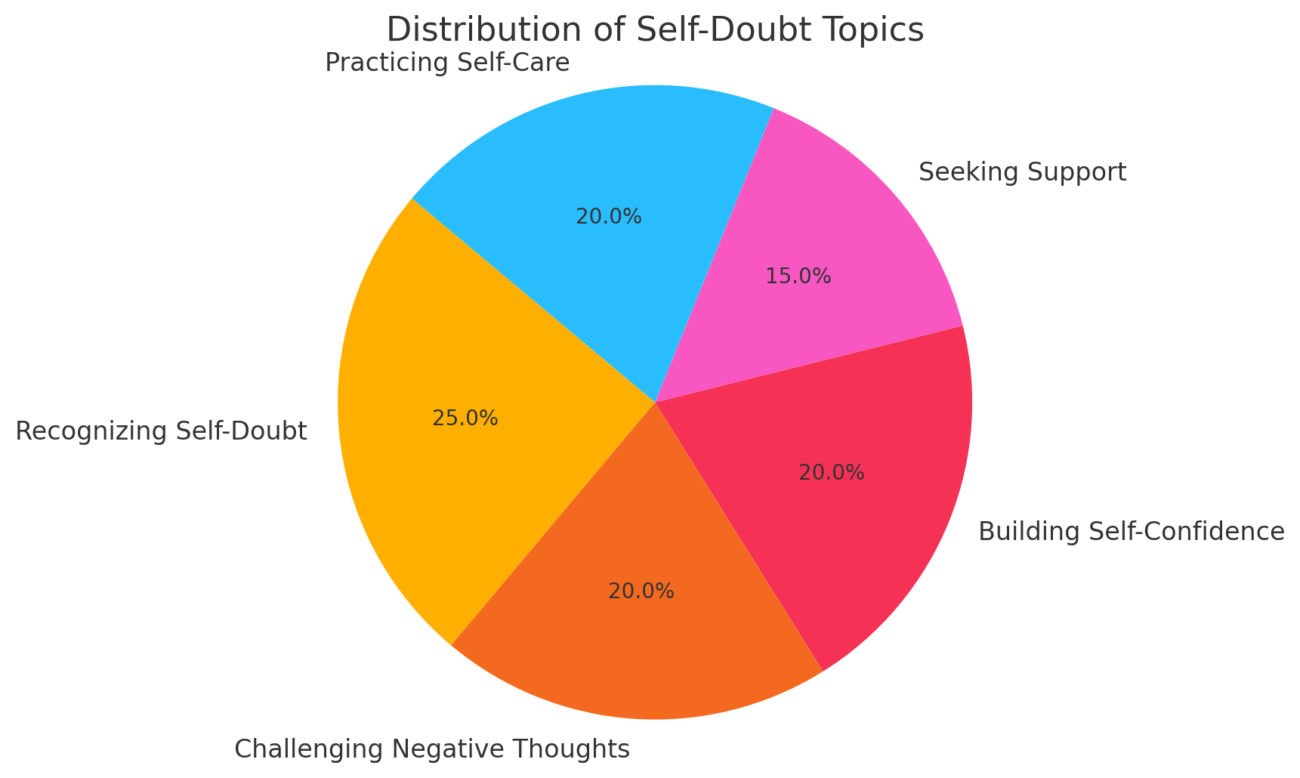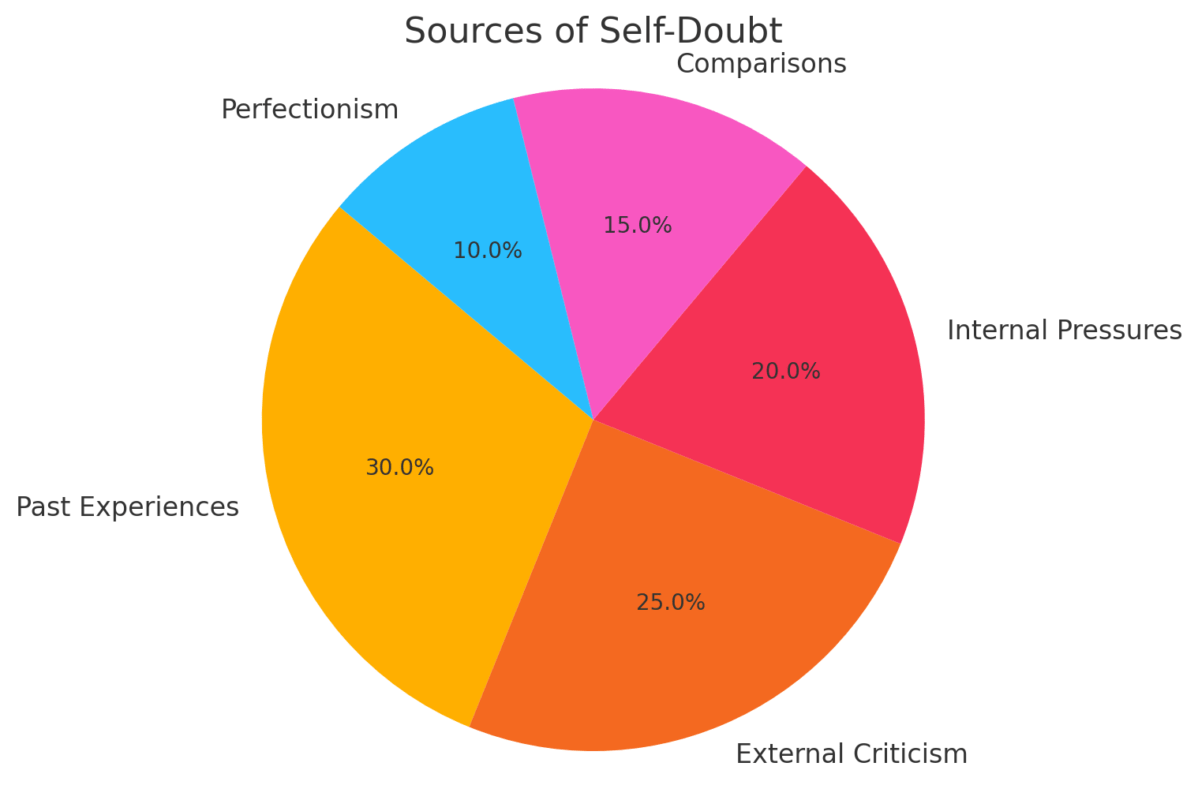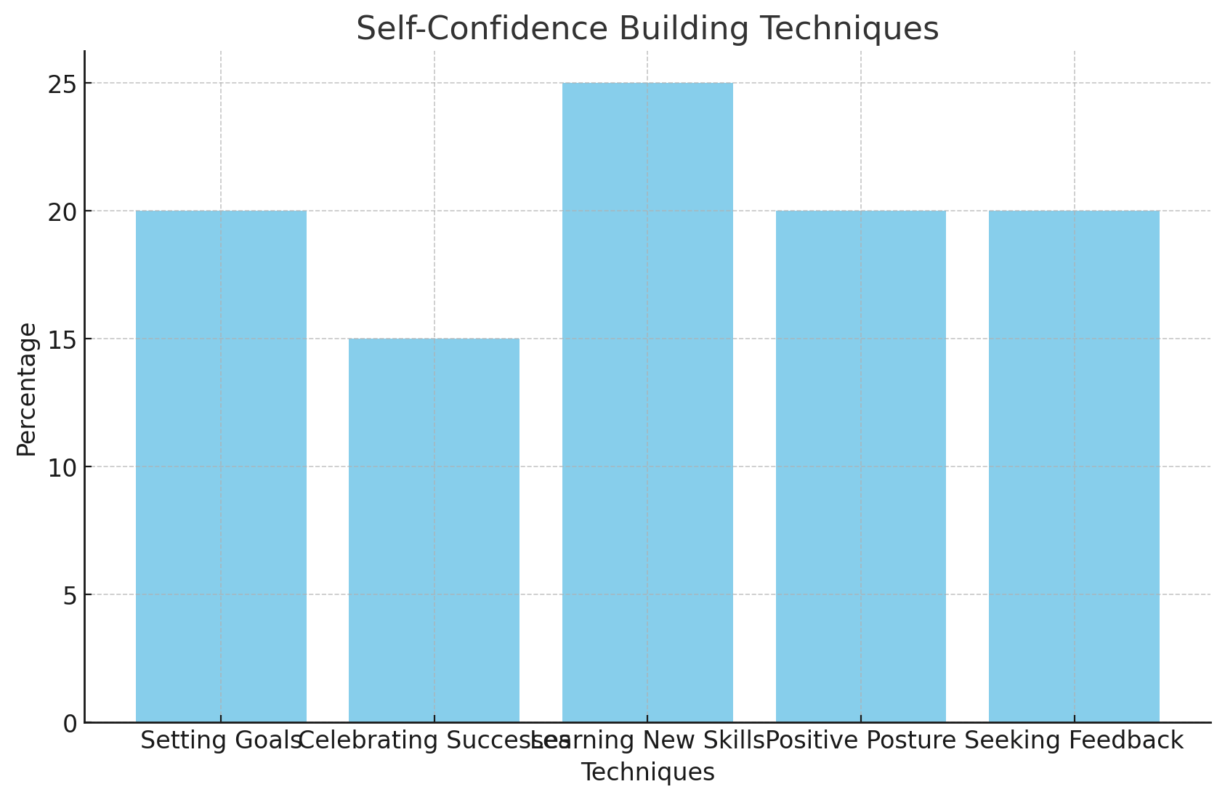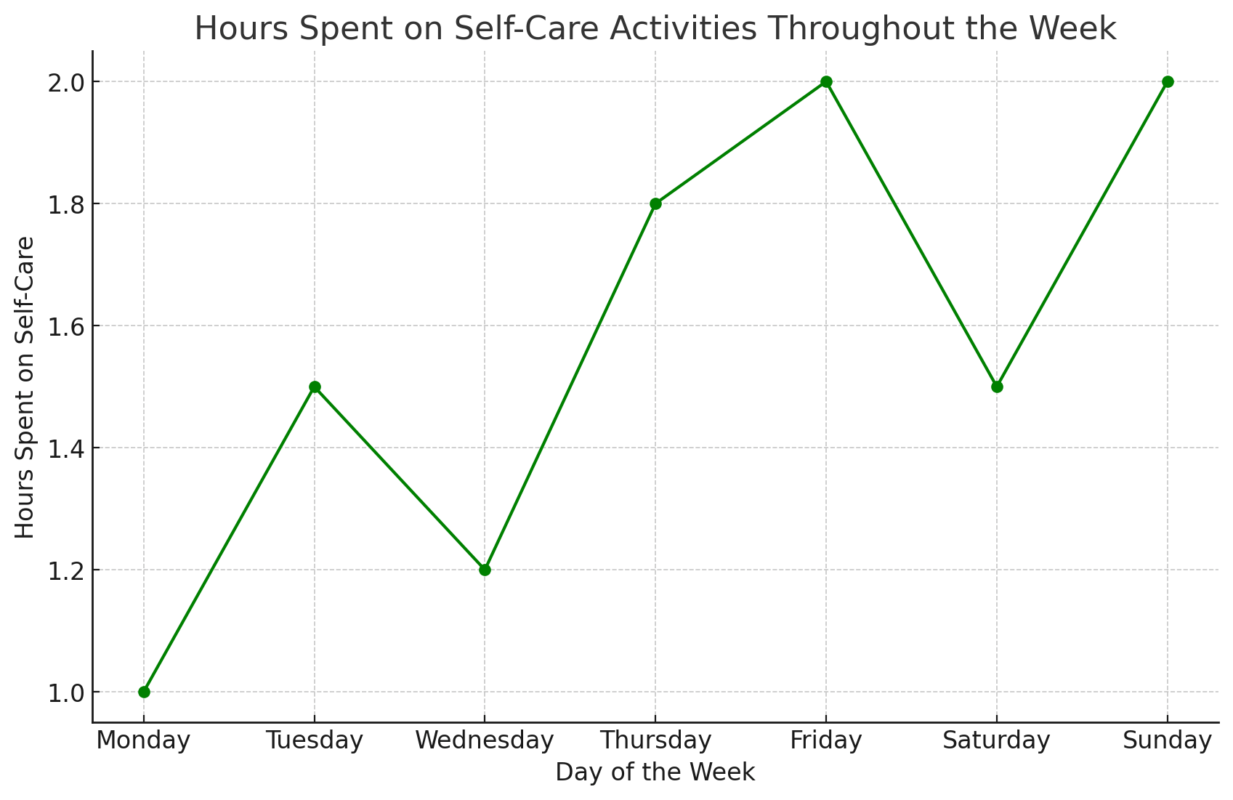Overcoming Self-Doubt for a Confident Life
Self-doubt can be a formidable barrier to achieving our goals and living a fulfilling life. It often manifests as a nagging voice in the back of our minds, questioning our abilities and decisions. Overcoming self-doubt is crucial for building self-confidence and unlocking our true potential. In this blog post, we’ll explore practical tips and strategies to help you combat self-doubt and lead a more confident life. If you’re looking for more ways to stay motivated and achieve your goals, be sure to check out our related posts on Simple Habits to Stay Motivated Every Day, Power of Positive Thinking in Daily Life, Practical Steps to Achieving Your Goals.
Identify Self-Doubt
Recognizing and identifying self-doubt is the first step towards overcoming it. Self-doubt often creeps in subtly, but it can have a profound impact on our actions and decisions.
Common Signs of Self-Doubt:
- Constantly second-guessing yourself: Frequent doubt about your decisions and actions.
- Fear of failure: Avoiding challenges because you are afraid of not succeeding.
- Negative self-talk: Regularly thinking or saying negative things about yourself.
- Comparing yourself to others: Feeling inferior when comparing your achievements to others.
Sources of Self-Doubt:
- Past experiences: Negative experiences or failures can create lasting doubts.
- External criticism: Harsh feedback or criticism from others can undermine your confidence.
- Internal pressures: High personal expectations and perfectionism can lead to self-doubt.
Strategies to Identify Self-Doubt:
- Keep a journal: Write down your thoughts and feelings to identify patterns of self-doubt.
- Reflect on your reactions: Pay attention to moments when you hesitate or avoid taking action.
- Seek feedback: Ask trusted friends or mentors for their perspective on your self-doubt.
Identifying self-doubt is essential for addressing it effectively. By understanding its sources and manifestations, you can begin to challenge and overcome it. For more on maintaining motivation and positive thinking, explore our posts on Power of Positive Thinking in Daily Life and Practical Steps to Achieving Your Goals.
Challenge Negative Thoughts
Overcoming self-doubt requires actively challenging negative thoughts that undermine your confidence. These thoughts often stem from irrational beliefs and cognitive distortions that distort your perception of reality. To combat self-doubt, it is essential to recognize and reframe these negative thoughts.
Strategies to Challenge Negative Thoughts:
- Identify Cognitive Distortions: Recognize common distortions such as all-or-nothing thinking, overgeneralization, and catastrophizing. Understanding these patterns can help you see your thoughts more clearly.
- Reframe Negative Thoughts: When you catch yourself thinking negatively, try to reframe the thought in a more positive or realistic light. For example, instead of thinking, “I’ll never be good at this,” reframe it to, “I can improve with practice and effort.”
- Use Positive Affirmations: Replace negative self-talk with positive affirmations. Remind yourself of your strengths and past successes. Saying things like, “I am capable and resilient,” can help shift your mindset.
- Seek Evidence: Challenge negative thoughts by seeking evidence that contradicts them. Ask yourself, “What proof do I have that this thought is true?” Often, you’ll find that your negative beliefs lack solid evidence.
- Practice Mindfulness: Mindfulness techniques can help you become more aware of your thoughts without getting caught up in them. This awareness can make it easier to challenge and change negative thinking patterns.
Challenging negative thoughts is a critical step in overcoming self-doubt. For more tips on staying motivated and maintaining a positive mindset, read our posts on Power of Positive Thinking in Daily Life and Finding Inspiration to Keep Motivation High.
Build Self-Confidence
Building self-confidence is essential for overcoming self-doubt and achieving your goals. Confidence comes from within and can be cultivated through intentional actions and mindset shifts.
Strategies to Build Self-Confidence:
- Set Achievable Goals: Start with small, achievable goals that can help you build momentum and a sense of accomplishment. As you achieve these goals, gradually set more challenging ones.
- Celebrate Your Successes: Take time to celebrate your achievements, no matter how small they may seem. Recognizing your successes can boost your confidence and motivate you to keep going.
- Practice Self-Compassion: Treat yourself with kindness and understanding, especially when you encounter setbacks. Self-compassion helps you maintain a positive self-image and resilience in the face of challenges.
- Learn New Skills: Continuously learning and developing new skills can enhance your confidence. Whether it’s taking a course, learning a new hobby, or improving a professional skill, growth fosters confidence.
- Adopt a Positive Posture: Body language can influence how you feel about yourself. Stand tall, make eye contact, and smile to project confidence, even if you don’t feel it initially.
- Seek Feedback and Mentorship: Constructive feedback from trusted friends, family, or mentors can provide valuable insights and encouragement. Surrounding yourself with supportive people helps reinforce your confidence.
Building self-confidence is a journey that requires consistent effort and practice. For more practical steps to boost your confidence and achieve your goals, check out our post on Practical Steps to Achieving Your Goals. Additionally, our article on Simple Habits to Stay Motivated Every Day offers more tips to keep your motivation and confidence high.
Seek Support Systems
One of the most effective ways to overcome self-doubt is by seeking support from others. Surrounding yourself with a strong support system can provide encouragement, advice, and a fresh perspective when self-doubt creeps in.
Benefits of a Support System:
- Emotional Support: Friends and family can offer a listening ear and emotional comfort, helping you navigate challenging times.
- Practical Advice: Mentors and colleagues can provide practical advice and feedback that can help you grow and improve.
- Increased Accountability: Having someone to hold you accountable can motivate you to stay on track with your goals.
Strategies to Build a Support System:
- Reach Out to Friends and Family: Don’t hesitate to share your feelings and challenges with those close to you. They can offer valuable support and reassurance.
- Join Support Groups: Consider joining groups or communities where you can connect with others facing similar challenges. This can provide a sense of belonging and mutual support.
- Seek Professional Help: If self-doubt is significantly impacting your life, consider seeking help from a therapist or counselor. They can offer strategies and tools to manage self-doubt.
By building a robust support system, you can significantly reduce the impact of self-doubt and foster a more confident outlook. For more insights on staying motivated and achieving your goals, explore our posts on Finding Inspiration to Keep Motivation High and Practical Steps to Achieving Your Goals.
Practice Self-Care
Practicing self-care is essential for overcoming self-doubt and maintaining overall well-being. Taking care of your physical, emotional, and mental health can boost your confidence and resilience.
Self-Care Strategies:
- Mindfulness and Meditation: Incorporate mindfulness and meditation into your daily routine to reduce stress and increase self-awareness. This can help you stay grounded and manage negative thoughts.
- Regular Exercise: Physical activity is a powerful way to boost your mood and energy levels. Aim for at least 30 minutes of exercise most days of the week.
- Healthy Eating: Nourish your body with a balanced diet rich in fruits, vegetables, lean proteins, and whole grains. Proper nutrition supports overall health and well-being.
- Adequate Sleep: Ensure you get enough sleep each night. Aim for 7-9 hours of quality sleep to support mental clarity and emotional stability.
- Engage in Hobbies: Spend time doing activities you enjoy. Hobbies can provide a sense of accomplishment and a break from daily stressors.
- Set Boundaries: Learn to say no and set boundaries to protect your time and energy. This can prevent burnout and maintain a healthy work-life balance.
By prioritizing self-care, you can create a strong foundation for overcoming self-doubt and building confidence. For additional strategies on maintaining motivation and a positive mindset, check out our articles on Simple Habits to Stay Motivated Every Day and Power of Positive Thinking in Daily Life. Additionally, integrating these self-care practices into your routine can complement the strategies discussed in Creating a Productive Morning Routine: Tips and Tricks.
Conclusion
Overcoming self-doubt is a journey that involves recognizing and challenging negative thoughts, building self-confidence, seeking support, and practicing self-care. By implementing these strategies, you can develop a more confident and fulfilling life. Remember to explore our interconnected posts for more tips and inspiration on staying motivated and achieving your goals.
Frequently Asked Questions
- How can I identify and address self-doubt effectively? Identifying self-doubt involves recognizing negative thoughts and patterns in your behavior. Addressing it can be achieved through mindfulness, reframing negative thoughts, and seeking support from friends, family, or professionals. A key strategy is creating a productive morning routine that includes positive affirmations and goal-setting to start your day on a confident note.
- What are some practical steps to build self-confidence? Building self-confidence involves setting small, achievable goals, celebrating successes, practicing self-compassion, and learning new skills. Regularly engaging in activities that challenge and stretch your abilities can also enhance confidence. Incorporating these practices into a productive morning routine can further boost your self-assurance throughout the day.
- How can seeking support systems help in overcoming self-doubt? Seeking support systems provides emotional comfort, practical advice, and increased accountability. Friends, family, mentors, or support groups can offer different perspectives and encouragement, helping you navigate self-doubt. Engaging with a supportive community can reinforce your confidence and provide tools to manage self-doubt effectively.
- Why is self-care important in overcoming self-doubt? Self-care is crucial for maintaining mental and emotional well-being, which directly impacts your ability to overcome self-doubt. Practices such as mindfulness, regular exercise, healthy eating, adequate sleep, and engaging in hobbies help build resilience and confidence. Integrating self-care into your daily routine, especially as part of creating a productive morning routine, sets a positive tone for the day and combats self-doubt.











